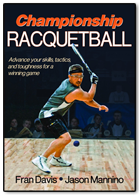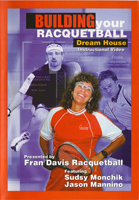Fran Davis: Take Your Best Shot
Taking the right shot at the right time means making your opponent run the farthest distance to get to the ball. When many get into the heat of the battle, they don’t think about shot selection—but just bang away and play what we call survival racquetball. Or, they go for a favorite rather than one that can win the rally, putting their opponent on the defense. Here's how to determine your best shot, and how to make it when you need to most. (more…)










